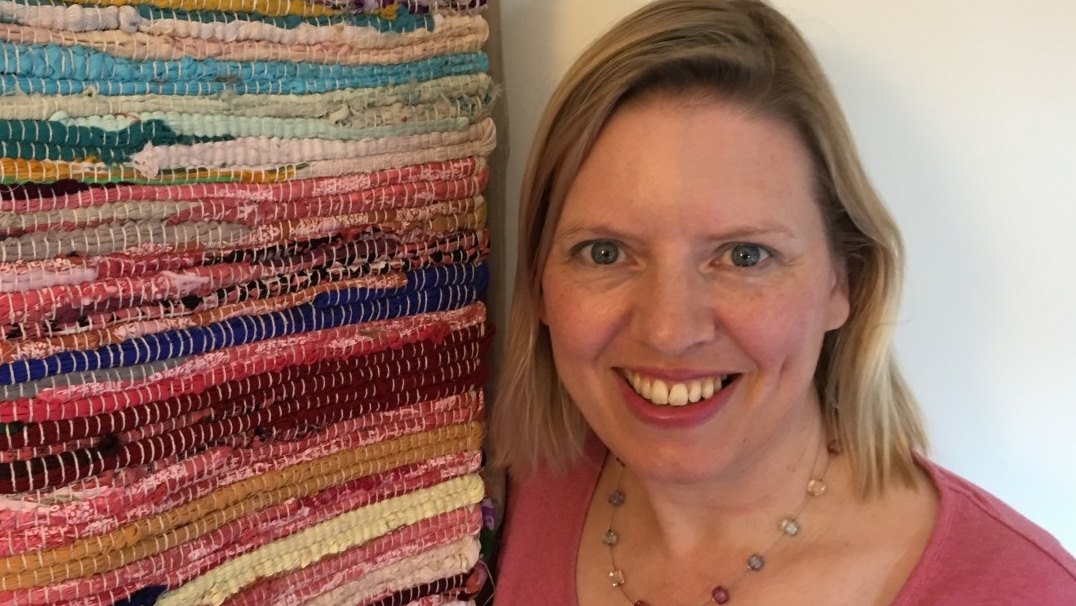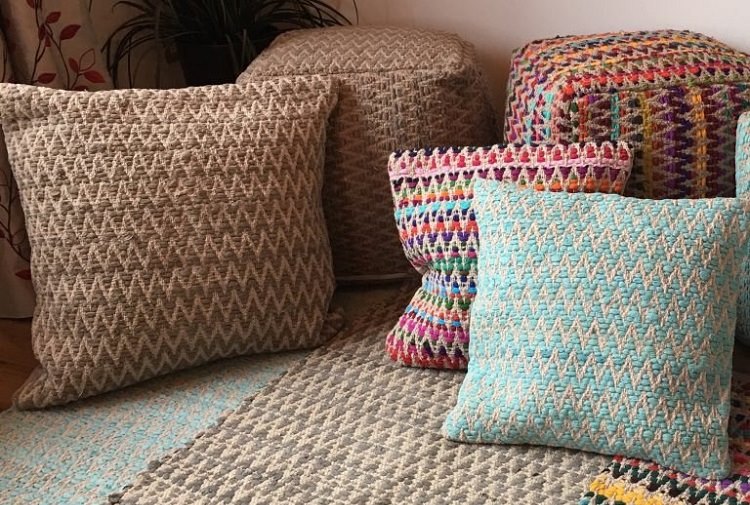The rural Scottish entrepreneur selling eco-friendly goods to the world

Posted: Thu 4th Apr 2019
Online marketplaces are empowering small businesses everywhere, including on a remote Scottish island.
Eco-friendly soft furnishing company Second Nature was started by Karen Riddick "almost by accident". A decade later, the company that got its start on the Isle of Islay has moved to Dumfries and is selling around the world.
Why did you launch the business?
I was working full-time for the Scottish Environment Protection Agency (SEPA) and running a B&B. I bought some fair-trade furniture for the rooms and put the leftover pieces on eBay. The stuff slowly sold over the following weeks and that was all it took for me to catch the selling bug!
I kept it going as a source of extra pocket money. Another personal motivator was the realisation that e-commerce might solve a problem I encountered at SEPA. It was well recognised that even if there was the technology to recycle waste materials, there had to be an end market for the products.
When did it start feeling like a proper business?
Selling from my house felt like a hobby. It started feeling like a proper business when I had to rent extra space. I moved to my home town of Dumfries. We quickly went from a two bedroom flat to a six-bedroom house where I filled all the rooms, attic and basement with soft furnishings.
Once I had the extra space I was able to buy in bulk, but it got pretty ridiculous. Shortly after moving there, an articulated lorry reversed the wrong way down our one-way street. It deposited three pallets of textiles on the pavement and got stuck in the road with a queue of traffic waiting. Up until then, I had been very secretive about running a business from my home - but the game was up that day!
After apologising to everyone waiting in their cars, I did what I should have done months before and rented commercial storage.
How did you develop the export side of your business?
When you sell online anyone can see your products, so exporting is a natural progression. My first overseas order was on my own website, which I set up two years after starting on eBay.
I had no idea that anyone could view our website as it was still under development but an American buyer purchased an egg cup for £5. The postage was £28 so the buyer decided to cancel but it was exciting to receive the order anyway!
Today, more than half of our customers are from overseas, mainly Europe. I can't claim to be an expert in exporting, but modern ecommerce marketplaces make it easy to expand your international sales.
eBay has a Global Shipping Programme, PayPal offers a UK hub and forwards international orders at no extra cost to the seller. For us though, it is Amazon that has provided us with the framework to truly grow our international customer base.
Amazon make it easy to translate and transfer your Amazon UK store into its European marketplaces. We now have translated stores in France, Germany, Italy and Spain.
We also use the Fulfilled by Amazon service, which means that Amazon store our stock in their UK and European warehouses and handle our orders.
How do you approach the pricing and profitability of products?
Second Nature now has over 500 product lines, but I don't focus too much on the profitability of individual items. I know what my most and least profitable items are, but I look more at the bottom line of the business.
I sometimes sell things because I like them and want to support the concept or an individual seller even if profit margins are not great.
I need to think about the original cost of the item then look at my importing or transport costs, storage and other overheads, plus the postage charges for getting a product to the customer.
I also have to take currency fluctuations into account now that we are selling internationally. Overall, I tend to focus on my own costs and margins and try not to be influenced by competitor prices. It's easier for me to do that as we generally sell non-mainstream products.
There are plenty of ecommerce sites that do well on low margins of high-volume sales. There are some who make profit purely on charging 50p more for the postage. There is no limit to the combination of business models that might work.
When buying from UK sources, wholesalers often like us to retail at two to three times the cost of the product. When importing our own products, the multiplier varies according to the costs of importing and storing. The range of profit across our products is a full spectrum - some make no profit whilst others have a 100% profit margin.

Do you think that running your own business while working elsewhere is a good idea?
Eventually, you might need to leave your other job behind but setting up your own business while working elsewhere can give you a great start. Having regular income to help you get going can take the pressure off those early days and give you freedom to explore various avenues.
Running an online shop meant that I could work at it in my free time and having a regular salary meant that I was able to invest in more stock.
I was less stressed about whether things were going to work out and was able to do things in my own time.
For me it meant that my business growth was slow, but it was also steady and sustainable. I did not leave my paid employment until four years after starting Second Nature.
What sort of advice would you offer other prospective business owners?
Think about whether whatever systems you put in place at the start they would work if your business was 10 or 100 times busier.
You might not be planning to grow - I certainly wasn't - but be prepared to! You don't need to spend more on these systems, you just need to consider whether they would handle scaling up or a rapid growth phase.
At the start I was only dealing with small volumes, so I didn't code my products properly or record information. I did everything manually instead of learning to use all the tools and software that can make life easier. I called my first product 'rug 1' and my second product 'rug 2'. That's fine when you have less than twenty rugs but when you have 854 it's a different story!
I still carry a lot of historical chaos with me and if I was starting my business from scratch there's a lot I would do differently.
What advice would you give to other businesses selling online?
You need to use great images and descriptions. Buying goods and services is a visual exercise and most people do not want to scroll through lots of information. Most marketplaces make it easy to upload images and provide short, punchy descriptions.
Ask yourself if your own independent website is the best channel to focus on. You'll often pay less fees but your browsing and buying traffic might be less than it is if you set up on a recognised marketplace. For me, Amazon works far better than my own website.
Why is confidence important to people that are starting up?
People starting their own business might have some confidence issues, especially if they are in a job which isn't enjoyable or fulfilling.
However, after starting your own business, you may find you're more brilliant than you thought you were! Your level of personal development will probably surprise you once you are free from the boundaries that unemployment, a boss or paid position create.
I have no background in retail or IT, so never thought I could run a successful online shop. I've had a lifelong battle with travel anxiety and never imagined I would travel overseas to source products, or thought I would be VAT registered in seven countries, employ staff or purchase commercial premises or that I would be asked to appear at events like this to tell others of my experience.
It's great to have reached this position but I'm no different to anyone else in terms of my potential to start and grow a business.
You might also like…
Get business support right to your inbox
Subscribe to our newsletter to receive business tips, learn about new funding programmes, join upcoming events, take e-learning courses, and more.
Start your business journey today
Take the first step to successfully starting and growing your business.
Join for free
